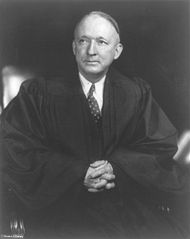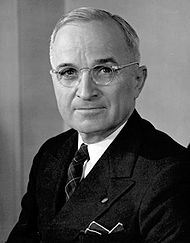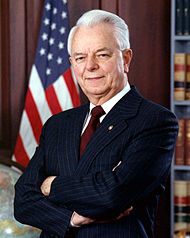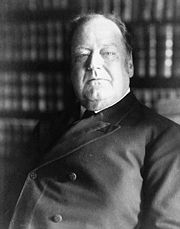- Ku Klux Klan members in United States politics
-
This article discusses notable figures in U.S. national politics who were alleged to have been members of the Ku Klux Klan prior to their public careers.
Contents
Individual cases
Harry Truman
Harry S. Truman was 33rd President of the United States from 1945 to 1953, and was from Missouri.
In 1924, Harry S. Truman was a judge in Jackson County, Missouri, which includes Kansas City. Truman was up for reelection, and his friends Edgar Hinde and Spencer Salisbury advised him to join the Klan. The Klan was politically powerful in Jackson County, and two of Truman's opponents in the Democratic primary had Klan support. Truman refused at first, but paid the Klan's $10 membership fee, and a meeting with a Klan officer was arranged.[2]
According to Salisbury's version of the story, Truman was inducted, but afterward “was never active; he was just a member who wouldn't do anything”. Salisbury, however, became Truman's bitter enemy in later years, so this version is suspect.[3]
According to Hinde and Truman's accounts, the Klan officer demanded that Truman pledge not to hire any Catholics or Jews if he was reelected. Truman refused, and demanded the return of his $10 membership fee; most of the men he had commanded in World War I had been local Irish Catholics.[4]
Truman had at least one other strong reason to object to the anti-Catholic requirement, which was that the Catholic Pendergast family, which operated a political machine in Jackson County, were his patrons; Pendergast family lore has it that Truman was originally accepted for patronage without even meeting him, on the basis of his family background plus the requirement that he was not a member of any anti-Catholic organization such as the Klan.[5] The Pendergast faction of the Democratic Party was known as the “Goats”, as opposed to the rival Shannon machine's “Rabbits”. The battle lines were drawn when Truman put only Goats on the county payroll,[6] and the Klan began encouraging voters to support Protestant, “100% American” candidates, which was anathema to the Catholic Pendergasts. The Klan allied itself against Truman and with the Rabbits, and Shannon instructed his people to vote Republican in the election, which Truman lost.[7] Truman later claimed that the Klan “threatened to kill me, and I went out to one of their meetings and dared them to try”, speculating that if Truman's armed friends had shown up earlier, violence might have resulted. However, biographer Alonzo Hamby believes that this story, which is not supported by any recorded facts, was a confabulation based on a meeting with a hostile and menacing group of Democrats that contained many Klansmen, showing Truman's “Walter Mitty-like tendency […] to rewrite his personal history”.[8] Sympathetic observers see Truman's flirtation with the Klan as a momentary aberration and point out that his close friend and business partner Eddie Jacobson was Jewish, and assert that in later years, Truman's presidency marked the first significant improvement in the federal government's record on civil rights since the post-Reconstruction nadir marked by the Wilson administration.[9] It is also possible to interpret it as a young politician's opportunistic attempt to get ahead. The incident was clearly entwined with the intricacies of machine politics, and may also be seen as an indication of Truman's long evolution in his outlook on race relations.
Robert Byrd
West Virginia's Democratic United States Senator Robert C. Byrd was a recruiter for the Klan while in his 20s and 30s, rising to the title of Kleagle and Exalted Cyclops of his local chapter. After leaving the group, Byrd spoke in favor of the Klan during his early political career. Though he claimed to have left the organization in 1943, Byrd wrote a letter in 1946 to the group's Imperial Wizard stating "The Klan is needed today as never before, and I am anxious to see its rebirth here in West Virginia." Byrd defended the Klan in his 1958 U.S. Senate campaign when he was 41 years old.[10]
Despite being the only Senator to vote against both African American U.S. Supreme Court nominees (liberal Thurgood Marshall and conservative Clarence Thomas) and filibustering the Civil Rights Act of 1964, Byrd has since said joining the Klan was his "greatest mistake." The NAACP gave him a 100% rating on their issues during the 108th Congress.[11] However, in a 2001 incident Byrd repeatedly used the phrase "white niggers" on a national television broadcast.[12]
Edward Douglass White
Wyn Craig Wade has asserted that Edward Douglass White, the Chief Justice of the United States from 1910 to 1921, told Thomas Dixon "I was a member of the Klan" at the 1915 White House screening of The Birth of a Nation.[13] No evidence has been found that corroborates his alleged admission. Note that his membership would have been in the 19th-century Klan, not the 1920s revived organization.
Warren G. Harding
Warren G. Harding was 29th President of the United States from 1921 to his death in 1923, and was from Ohio. Though there have been rumors about his membership, they are largely unsubstantiated. Given his high support for civil rights it is extremely unlikely that he ever officially joined.
Evidence for Harding's membership
Wyn Craig Wade states Harding's membership as fact and gives a detailed account of a secret swearing-in ceremony in the White House, but bases this claim on a private communication in 1985 from journalist Stetson Kennedy. Kennedy, in turn had, along with Elizabeth Gardner, tape recorded the "late 1940s" deathbed confession of former Imperial Klokard Alton Young, who claimed to have been a member of the "Presidential Induction Team" as Young was dying in a New Jersey Hospital. Young also claimed to have repudiated racism on his deathbed.[14] Wade says,[15]
- Simmons' ultimate vindication came when President Warren G. Harding agreed to be sworn in as a member of the Ku Klux Klan. A five-man “Imperial induction team,” headed by Simmons, conducted the ceremony in the Green Room of the White House. Members of the team were so nervous that they forgot their Bible in the car, so Harding had to send for the White House Bible. In consideration of his status, Harding was permitted to rest his elbow on the desk, as he knelt on the floor during the long oath taking. Afterward, the President appreciatively gave members of the team War Department license tags that allowed them to run red lights all across the nation.
Wade also states that “This matter was a major issue in letters sent to Coolidge during the 1924 election”, and gives a reference to “Case File 28, Calvin Coolidge papers, Manuscript Division, Library of Congress.” In this file there is a letter from Wizard Edward Young Clarke to President Calvin Coolidge on 27 December 1923, charging Wizard Hiram W. Evens with trying to turn the Klan into a “cheap political machine”. “It [the Klan] was to be an organization designed to up-build and develop spirituality, morality, and physically the Protestant white man of America.”
Evidence against Harding's membership
In their 2005 book Freakonomics, University of Chicago economist Steven D. Levitt and journalist Stephen J. Dubner wrote of their visit to Stetson Kennedy's Florida home and alluded to Warren Harding's possible Klan affiliation. However, in a New York Times Magazine Freakonomics column, entitled "Hoodwinked? Does it matter if an activist who exposes the inner workings of the Ku Klux Klan isn't open about how he got those secrets?"," (New York Times Magazine, January 8, 2006, pp. 26–28), Dubner and Levitt, publicizing a new, revised edition of Freakonomics, repeated the allegations of an author, Ben Green, who had contacted them accusing Stetson Kennedy of dishonestly concealing that he had had help from uncredited associates in his 1940s undercover work against the Klan. Accepting Green's disparaging view of Kennedy uncritically, Dubner and Levitt insinuated that Kennedy's alleged lack of candor now cast doubt on his journalistic integrity. Although nothing in their article specifically addressed whether Warren Harding was or was not a Klan member, they now indicated that they no longer accepted Stetson Kennedy's testimony about the Klan at full face value. Other scholars, however, such as Peggy Bulger, now head of the Folklife Division of the Library of Congress, who wrote her Ph.D. on Kennedy, strenuously countered Green, Levitt, and Dubner's accusations. In fact, Kennedy, whose own house had been firebombed and who had left the country in consequence, had concealed the identities of his associates in 1954 to protect them from reprisals but had never denied to Bulger or anyone who asked that he had had help in writing his stories. In 2006, The Florida Times-Union, after extensive research, published an article "KKK Book Stands Up to Claim of Falsehood" (January 29, 2006) substantiating the general accuracy of Kennedy's account of infiltrating the Klan, while acknowledging that (as he himself never denied) he had made use of dramatic effects and multiple narratives in his 1954 book I Rode with the Ku Klux Klan.
Primary source material on file at the Ohio Historical Society in Columbus does not contain evidence of Harding's alleged membership in the Klan.
Primary source material on file at the Marion County (Ohio) Historical Society (Warren G. Harding Collection) also does not confirm or indicate any involvement in the Klan, nor support the idea of Harding’s alleged Klan membership.
Harding was the first American President to publicly denounce lynching and did so in a landmark 21 October 1921 speech in Birmingham, Alabama, which was covered in the national press. Harding also vigorously supported an anti-lynching bill in Congress during his term in the White House. While the bill was defeated in the Senate, such activities would be in direct conflict with Klan membership.
The Site Administrator[who?] of the Harding Home Museum (Ohio Historical Society property) in Marion, Ohio, draws a relationship between Harding's alleged Klan activities directly to the rumor-mill stirred up after the President died in 1923 and Mrs. Harding in 1924.
In his book, The Strange Deaths of President Harding, historian Robert Ferrell Ph.D. claims to have been unable to find any records of any such "ceremony" in which Harding was brought into the Klan in the White House. Also, John Dean, in his 2004 book Warren Harding (edited by Arthur M. Schlesinger), also could find no proof of Klan membership or activity on the part of the 29th President to indicate support of the Klan.
Review of the personal records of Harding's Personal White House Secretary, George Christian Jr., also do not support the contention that Harding received members of the Klan while in office. Appointment books maintained in the White House, detailing President Harding's daily schedules, do not show any such event.
In addition to the above points, the 1920 Republican Party platform, which essentially expressed Harding's political philosophy, calls for Congress to pass laws combating lynching.[16]
Carl S. Anthony, biographer of Harding's wife (though not of Warren), found no such proof of Harding's membership in the Klan, he does however discuss the events leading up to the period when the alleged Klan ceremony was held in June 1923:
- knowing that the some branches of the Shriners were anti-Catholic and in that sense sympathetic to the Ku Klax Klan and that the Klan itself was holding a demonstration less than a half mile from Washington, Harding censured hate groups in his Shriners speech. The press "considered [it] a direct attack" on the Klan, particularly in light of his criticism weeks earlier of "factions of hatred and prejudice and violence [that] challeng[ed] both civil and religious liberty".[17]
Anthony also details Harding's induction into the Tall Cedars of Lebanon, a Shrine[citation needed] organization, during the convention week (making note of the conical hat used by the Tall Cedars in the ceremony); Anthony writes that he feels that the charges made by Grand Wizard Alton Young (reported by Wyn Craig Wade in 1985) against Harding were in "retaliation for the Shrine speech and another anti-bigotry speech made by Harding at the dedication of the Alexander Hamilton statue at the Treasury Building" in the previous month of May 1923.
In 2005, The Straight Dope presented a summary of many of these arguments against Harding's membership, and noted that, while it might have been politically expedient for him to join the KKK in public, to do it in private would have been of no benefit to him.[18]
David Duke
David Duke, a well-known white nationalist pundit, was openly involved in the leadership of the Ku Klux Klan.[19] He was founder and Grand Wizard of the Knights of the Ku Klux Klan in the mid-1970s; he re-titled his position as "National Director" and said that the KKK needed to "get out of the cow pasture and into hotel meeting rooms." He claims to have left the organization in 1980. In 1982 Duke switched political parties from Democrat to Republican. In 1989, he became a member of the Louisiana State Legislature from the 81st district, and was Republican Party chairman for St. Tammany Parish, Louisiana.[20]
Footnotes
- ^ Hugo Black's membership was the subject of Ray Sprigle's 1938 series of articles in the Pittsburgh Post-Gazette, for which Sprigle won the Pulitzer Prize.
- ^ McCullough 1992, 164.
- ^ Steinberg, 1962. Salisbury was a war buddy and former business partner of Truman's. Salisbury states that Truman attempted "to give Jim Pendergast control of [their] business." Salisbury began attacking Truman's patrons, the Pendergast machine, for corruption, and Truman retaliated by telegramming the Federal Home Loan Bank system about Salisbury, leading to Salisbury's conviction for filing a false affidavit. Salisbury contradicts Hinde's statement that the meeting at the Hotel Baltimore was one-on-one, naming at least six individuals who were present. Salisbury states that at the meeting, Truman had to receive a special dispensation to join, because his grandfather Solomon had been a Jew; however, Solomon was not a Jew, and the rumor of Truman's Jewish ancestry was only spread later, by the Klan, once the political lines had been drawn so that Truman was the Klan's enemy.
- ^ Wade, 1987, 196, gives essentially this version of the events, but implies that the meeting was a regular Klan meeting, rather than an individual meeting between Truman and a Klan organizer. An interview with Hinde at the Truman Library's web site (“Oral History Interview with Edgar G. Hinde” by James R. Fuchs, 15 March 1962, retrieved June 26, 2005) portrays it as a one-on-one meeting at the Hotel Baltimore with a Klan organizer named Jones. Truman's biography, written by his daughter (Truman, 1973), agrees with Hinde's version, but does not mention the $10 initiation fee; the same biography reproduces a telegram from O.L. Chrisman stating that reporters from the Hearst papers had questioned him about Truman's past with the Klan, and that he had seen Truman at a Klan meeting, but that "if he ever became a member of the Klan I did not know it."
- ^ McCullough 1992.
- ^ Truman 1973.
- ^ Truman 1973; McCullough 1992, 170.
- ^ Hamby 1995.
- ^ McCullough notes this extensively in his Pulitzer Prize-winning biography of Truman. While Truman had been raised in a family with Southern and Confederate leanings, he still said that he believed "in the brotherhood of all men before the law" (McCullough, p. 247). His work on civil rights was politically damaging but extensive nonetheless.
- ^ "Pianin, Eric. A Senator's Shame." Washington Post 19 June 2005.
- ^ NAACP Civil Rights Federal Legislative Report Card: 108th Congress
- ^ CNN: “Top Senate Democrat apologizes for slur”
- ^ Wade 1987.
- ^ “Woody Guthrie: Natural born anti-fascist” by Kennedy, retrieved 9 September 2005.
- ^ Wade 1987, 165, 477.
- ^ Republican Party Platform of 1920 (available from the American Presidency Project of the University of California, Santa Barbara).
- ^ Anthony 1998, 412-413.
- ^ Corrado, John (November 8, 2005). "Was Warren Harding inducted into the KKK while president?". The Straight Dope. Chicago: Creative Loafing Media, Inc.. http://www.straightdope.com/mailbag/mhardingkkk.html. Retrieved 2009-02-08.
- ^ "David Duke: In His Own Words". New York City: Anti-Defamation League. May 2000. http://www.adl.org/special_reports/duke_own_words/on_kkk.asp. Retrieved 2009-02-08. "The last eight years in which I had various leadership roles in the Klan were the most fulfilling and exciting of my life." Quote sourced as NAAWP News, first issue, National Association for the Advancement of White People, August 1980. David Duke founded the NAAWP as well.
- ^ "David Duke: In His Own Words". New York City: Anti-Defamation League. May 2000. http://www.adl.org/special_reports/duke_own_words/duke_intro.asp. Retrieved 2009-02-08.
References
- Anthony, Carl Sferrazza. Florence Harding, New York: W. Morrow & Co. 1998.
- Dean, John; Schlesinger, Arthur M. Warren Harding (The American President Series), Times Books, 2004.
- Ferrell, Robert H. The Strange Deaths of President Harding. University of Missouri Press, 1996.
- Hamby, Alonzo L. Man of the People: A Life of Harry S. Truman, New York: Oxford University Press, 1995.
- McCullough, David. Truman. New York: Simon & Schuster, 1992.
- Steinberg. Man From Missouri. New York: Van Rees Press, 1962.
- Truman, Margaret. Harry S. Truman. New York: William Morrow and Co. (1973).
- Wade, Wyn Craig. The Fiery Cross: The Ku Klux Klan in America. New York: Simon and Schuster (1987).
Categories:- Ku Klux Klan members
Wikimedia Foundation. 2010.




